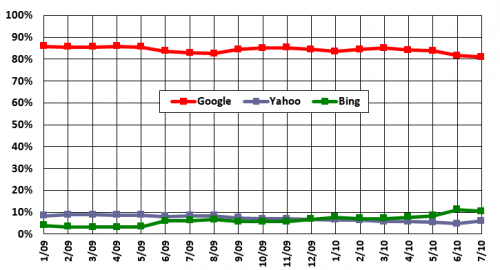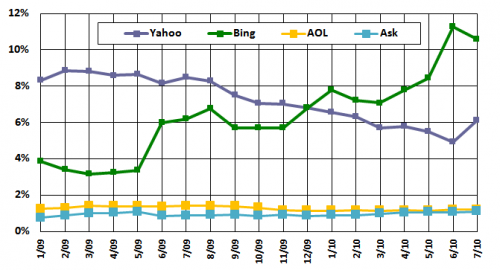Chitika: Bing Passes Yahoo In Search Market Share
Well here’s a surprise. New stats from Chitika show Bing has taken over the second place spot for search market share from Yahoo — and back in January 2010! Chitika is an advertising network similar to Google AdSense. The company receives data about visits to the 80,000 sites in its network, which are mostly US […]
Well here’s a surprise. New stats from Chitika show Bing has taken over the second place spot for search market share from Yahoo — and back in January 2010!
Chitika is an advertising network similar to Google AdSense. The company receives data about visits to the 80,000 sites in its network, which are mostly US based, though a handful are in Canada and the UK, it tells me.
Bing Takes #2
The stats show that Google remains the top driver of search-related traffic to sites in the Chitika network, followed by Bing, which overtook Yahoo in January 2010. The chart below shows the share of traffic that each of the three major search engines drive to Chitika’s North American web sites stretching back to January 2009:

This chart drops Google, so you can more clearly see Bing’s overtaking of Yahoo. It also shows stats for the smaller search engines of Ask and AOL:
The first leap for Bing is in June 2009, when Bing was formally launched. It was a rebranded, revamped version of Microsoft’s prior search engine, Live Search. (Traffic shown for Bing in the chart is actually Live Search + Bing combined, which is why you see a “Bing” line from before the Bing brand existed.
Bing’s launch was accompanied by a huge marketing effort by Microsoft to get the word out. That’s continued on over the past year. In June 2010, Bing reached an all-time high over the period shown, driving 11.3% of search-related traffic to the Chitika network. My guess is the spike was helped by renewed attention about Bing as it had its one-year anniversary. Those 40 mentions of Bing by Stephen Colbert may also have helped.
Benchmarking Bing
Chitika’s reported the overtaking earlier, such as in these stats from last month. I was on vacation when these came out and didn’t really register the Yahoo-Bing flip-flop until reviewing the latest numbers this month.
FYI, the figures in the charts I’ve shown above are different than those Chitika reported earlier. The earlier figures were based on worldwide traffic and each “month” was really traffic for the first two weeks of each month. The figures above are for the full month shown, and for North America.
The latest stats for July 2010 show Google way ahead of the others with an 81.6% share, followed by Bing at 10.6% and then Yahoo at 6.5%. Here’s a sample of data over the past two years, including the latest from July:
| Search Engine |
Jan. 09 | Jul. 09 | Jan. 10 | Jul. 10 |
| 85.8% | 83.0% | 83.6% | 81.0% | |
| Yahoo | 8.3% | 8.5% | 6.6% | 6.1% |
| Bing | 3.9% | 6.2% | 7.8% | 10.6% |
| AOL | 1.3% | 1.4% | 1.2% | 1.2% |
| Ask | 0.8% | 0.9% | 0.9% | 1.1% |
Chitika also will report on the figures later today on its research blog.
Why’s Chitika Different?
In contrast to Chitika, most of the US rating services show that Yahoo is still ahead of Bing. For example, last month comScore reported that Yahoo was ahead of Bing by about 6 points of share; Hitwise had Yahoo ahead by about 4.5% of share. Nielsen had Bing behind Yahoo by only 0.3% of share, but that’s still much different than the 3.5 point lead over Yahoo that Chitika gives Bing.
One key differences is that the ratings services named generally measure activity at the search engines themselves, the number of searches happening at each of them. In contrast, Chitika is measuring how many visitors leave a search site and come to web sites in its network.
It could be that Yahoo remains having more searches at its site, as the major ratings services find, but that less of that traffic is “escaping” out of Yahoo and to third-party web sites such as those in Chitika’s network.
Indeed, it’s long been the case that many webmasters commonly report that they receive far more traffic from Google than the searches the ratings services report happening there — and far less from Yahoo. My own suspicion has been that Yahoo is very good at recycling people who search at Yahoo back into Yahoo’s own properties.
It could also be that some sites on the Chitika network are simply more successful in generating traffic from Bing that ordinary web sites, though I’d find that surprising as a major factor. Ads could have an impact. The traffic measured is for both paid and unpaid traffic from the search engines. So if some sites in the network are doing major advertising on Bing and not Yahoo, that might also contributed.
Contributing authors are invited to create content for Search Engine Land and are chosen for their expertise and contribution to the search community. Our contributors work under the oversight of the editorial staff and contributions are checked for quality and relevance to our readers. The opinions they express are their own.
Related stories
New on Search Engine Land
